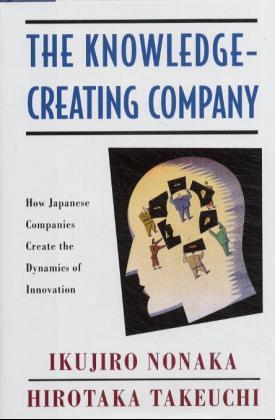
The Knowledge-Creating Company - How Japanese Companies Create the Dynamics of Innovation
| Verlag | Oxford University Press |
| Auflage | 1995 |
| Seiten | 304 |
| Format | 24,1 cm |
| Gewicht | 562 g |
| Artikeltyp | Englisches Buch |
| ISBN-10 | 0195092694 |
| EAN | 9780195092691 |
| Bestell-Nr | 19509269EA |
This book seeks an answer to the question: exactly what are the unique characteristics of Japanese firms in product development behaviour? The authors conclude that Japanese firms uniquely manage knowledge - they create it in the course of product development.
Klappentext:
How has Japan become a major economic power, a world leader in the automotive and electronics industries? What is the secret of their success? The consensus has been that, though the Japanese are not particularly innovative, they are exceptionally skilful at imitation, at improving products that already exist. But now two leading Japanese business experts, Ikujiro Nonaka and Hiro Takeuchi, turn this conventional wisdom on its head: Japanese firms are successful, they contend,
precisely because they are innovative, because they create new knowledge and use it to produce successful products and technologies.
Examining case studies drawn from such firms as Honda, Canon, Matsushita, NEC, 3M, GE, and the U.S. Marines, this book reveals how Japanese companies translate tacit to explicit knowledge and use it to produce new processes, products, and services. How has Japan become a major economic power, a world leader in the automotive and electronics industries? What is the secret of their success? The consensus has been that, though the Japanese are not particularly innovative, they are exceptionally skilful at imitation, at improving products that already exist. But now two leading Japanese business experts, Ikujiro Nonaka and Hiro Takeuchi, turn this conventional wisdom on its head: Japanese firms are successful, they
contend, precisely because they are innovative, because they create new knowledge and use it to produce successful products and technologies.
Examining case studies drawn from such firms as Honda, Canon, Matsushita, NEC, 3M, GE, and the U.S. Marines, this book reveals how Japanese companies translate tacit to explicit knowledge and use it to produce new processes, products, and services.
Rezension:
When the authors detail specific examples of knowledge creation, the reader's interest awakens. The Wall Street Journal
